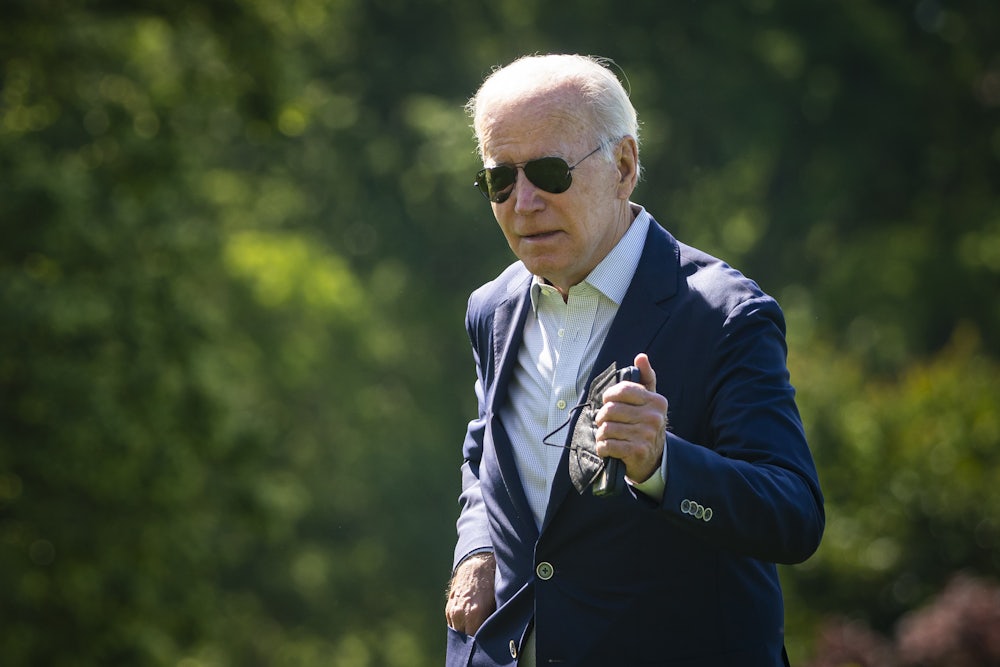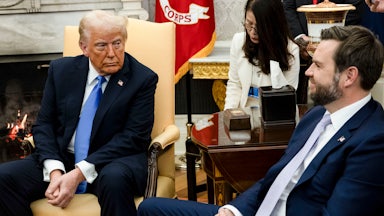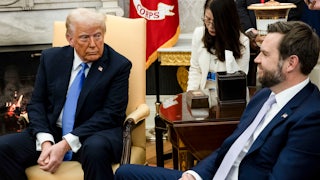Joe Biden is old—79 years old now, he will be 82 when the next president is inaugurated in 2025. He is also underwater in the polls. According to FiveThirtyEight’s poll of polls, fewer than 40 percent of voters rate his presidency positively as of Monday; more than 53 percent disapprove. The Democratic Party is racing to an all-but-certain bloodbath in November’s midterm elections and is likely to lose control of both chambers of Congress. This means that the final two years of Biden’s presidency will be beset by baseless and intrusive investigations (if not impeachment on an endless scroll) and inertia. And none of that covers the worst inflation in decades, numerous geopolitical crises, and whatever other horrors the world unleashes between now and November 2024.
Biden can’t be stuck with all the blame. Much of his legislative agenda fell by the wayside thanks to the inability of Democratic lawmakers to resolve their own internecine negotiations. But Democrats are worried and for good reason. Biden’s age creates a not-unjustified impression that he may not be the ideal person to handle the myriad crises the United States is facing at the moment. Moreover, Biden’s unpopularity has been stubbornly constant—his approval rating has been on the decline for nearly a year. And so it is perhaps no surprise that a murmuration, over whether Biden’s the best choice to run for president in two years’ time, has begun.
Recent stories in New York and The New York Times capture this mix of angst and frustration. The Times noted the “challenges facing the nation mount” and described the party’s “fatigued base,” while observing that many party insiders “feel sorry for [Biden].” New York, meanwhile, set the scene in similar terms: “With Trumpism reascendant, ambivalence about Biden’s age and political standing is fueling skepticism just as the image of his understudy, Vice-President Kamala Harris, dips even further than his.” But while there’s little doubt that the Democrats and Biden are in deep trouble, there isn’t really a solid case to be made that the party should change horses—at least not with months before the midterms and years to go in Biden’s term.
Democrats couldn’t have predicted many of the crises that have caused the Biden presidency to flatline since late August of last year. The withdrawal from Afghanistan was much clumsier than it needed to be. But few foresaw the serious, prolonged threat of inflation—Treasury Secretary Janet Yellen has only recently offered a mea culpa for her rosier predictions—and now that we’re in its grip, there aren’t many options at the disposal of a president to rapidly reverse the trend. Similarly, the scope of Vladimir Putin’s invasion of Ukraine was also difficult to envision before it kicked off, and the White House has done most of what could realistically be expected in response.
Even so, the big picture for Democrats is hardly shocking. Incumbent parties typically get trounced in the midterm elections, and 2022 will be no different. It is exceedingly rare for incumbent parties to gain ground in the midterm elections. In fact, since the start of the Civil War, it’s only happened twice and in moments of national crisis: Once in 1934 following the launch of the New Deal and again in 2002 after the September 11 terrorist attacks. Biden’s age, meanwhile, didn’t just emerge as a concern; it was a factor in the Democratic primary Biden won, and Donald Trump attempted to make Biden’s cognitive faculties one of the big election storylines when they faced off in the general election. Yes, Biden will be four years older in 2024—but so will we all, including the Republican Party’s most likely nominee, Donald Trump, who will be 78.
This recent boomlet of stories regarding the party making a big switch at the top of the ticket is a new, apocalyptic take on the age-old Democrats in disarray story. But this Chicken Little response to dampening political prospects is also normal.
But just because this storyline is emerging doesn’t mean it makes a lot of sense. Are there Democratic operatives lying around right now, happy to be the anonymous source for this kind of story? Sure. The bigger problem facing Democrats—and with anyone pitching the idea that Democrats should be looking for a successor—is that there really isn’t one on hand. After The New York Times makes mention of the deeply unpopular Harris, it gets to the bottom of a barrel rather swiftly:
These Democrats mentioned a host of other figures who lost to Mr. Biden in the 2020 primary: Senators Amy Klobuchar of Minnesota, Bernie Sanders of Vermont, Elizabeth Warren of Massachusetts and Cory Booker of New Jersey; Transportation Secretary Pete Buttigieg; and Beto O’Rourke, the former congressman who is now running for Texas governor, among others.
So that’s a bunch of people who already have the distinction of being beaten by Biden, some of whom fail to resolve the age issue that is supposedly a preeminent concern. New York’s roster, meanwhile, is more imaginative if also more far-fetched:
Governor Roy Cooper—the conference’s host, who had twice won North Carolina in the same years the swing state was carried by Donald Trump—was the most frequent topic of shadow-campaign chatter. Governor Phil Murphy, the New Jerseyan whose national ambitions are among Washington’s worst-kept secrets, was a close second. Also in heavy rotation, according to Democratic power brokers in the mix (and familiar with months of similar conversations): Governor J.B. Pritzker, the billionaire hotel-chain heir from Illinois, and Governor Jared Polis, the Coloradan with a mandate-light approach to COVID. When the conversation stretched into the bar, it lingered on Governor Gavin Newsom, who is coasting to reelection after defeating a recall attempt in California, and Governor Gretchen Whitmer, who knows from personal experience about the rising threat of white nationalism in Michigan.
Of all the candidates name-checked in the above roster of options, Sanders enjoys the most relative popularity—though he is a divisive figure within the party—and he’s even older than Biden. Murphy, meanwhile, only narrowly won reelection in New Jersey eight months ago, squeaking out a win over a relative unknown he was supposed to beat by double digits. Few have heard of Cooper, Pritzker, or Polis outside of their own states. The Democrats have boasted about the party’s deep bench, but the party doesn’t have a magic wand to simply anoint one of these figures the Chosen One. The idea of replacing Biden is just a fantasy. The idea that any one of these prospective candidates stands a better chance of beating Donald Trump may very well be as well.
And so the portrait that emerges is one that we’ve known for a while. Biden is old. The Democrats are going to get shellacked in the midterms. Their popular agenda didn’t pass because not enough Democrats supported it in the end. But no one really has any idea what might happen in the next two years, and what’s known isn’t enough to just toss Biden’s biggest strength, his incumbency, out the window, in favor of either a familiar candidate voters preferred less than Biden or an untested alternative yet to emerge on the scene. Regardless, Democrats should understand that there are few plausible scenarios in which swapping out Biden doesn’t get treated as a panicky decision. In theory, it may look like a justifiable move. In practice, it will be a world of hurt.










